|
|
|
Sort Order |
|
|
|
Items / Page
|
|
|
|
|
|
|
| Srl | Item |
| 1 |
ID:
124622
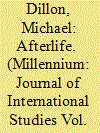

|
|
|
|
|
| Publication |
2013.
|
| Summary/Abstract |
This article provides a prolegomena to a discussion of what Michel Foucault meant by 'political spirituality' and 'the courage of truth (parrhesia)', terms which preoccupied his last lectures at the Collège de France and through which he continued to pursue his lifelong concern with the politics of truth and the history of the present. The article approaches these issues through the fate of the three strategic figures - God, Man and Life - that have traditionally problematised western rules of truth and truths of rule. It then proceeds to explore the living death, or afterlife, of Man and Life, which calls for a new courage of truth, and to which 'political spirituality' has been one response.
|
|
|
|
|
|
|
|
|
|
|
|
|
|
|
|
| 2 |
ID:
123582
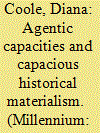

|
|
|
|
|
| Publication |
2013.
|
| Summary/Abstract |
In this article, I note that the idea of a new materialist turn has recently been gathering steam. The first part considers some of the signature elements of the new materialisms. The most distinctive aspect identified here is the invocation of a generative or vital ontology of immanence. Following discussion of some of its principal claims, the article draws out its implications for reconceptualising agency, in particular regarding the way agentic capacities are recognised to be distributed across animate, and perhaps also inanimate, entities. The significance of this development for the political sciences is then explored. In a second part, I suggest that the new materialism entails a normative project. Here, ethical overtures towards a new sensitivity predicated on vital materialist insights are contrasted with a renewed critical theory. The latter is commended as a material reckoning of the 21st century: a project provisionally labelled a capacious historical materialism.
|
|
|
|
|
|
|
|
|
|
|
|
|
|
|
|
| 3 |
ID:
147688
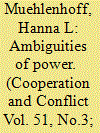

|
|
|
|
|
| Summary/Abstract |
Traditional definitions of power assume a unidirectional and coercive relationship between two actors. The debate about power in International Relations has questioned such a compulsive unidirectionality by pointing to the multidimensionality of power, as well as to the power of those who are traditionally seen at the receiving end. It is especially the latter aspect that has not been taken up seriously by empirical analyses. Moreover, research has ignored the complex power struggles the ‘receiving’ actors are engaged in and their possibility of resistance. If taken into account, these Foucauldian revisions of the concept of power allow us to analyse the development of the relationship between Turkey and the European Union (EU) since the turn of the millennium in a much more nuanced way than is often done in the existing Europeanisation literature. This case is particularly interesting, firstly because of the change in relations between the EU and Turkey, questioning the condition of a credible membership perspective under which the traditional form of power of the EU over its neighbourhood becomes effective. It secondly shows that the EU’s power extends much beyond the imposition of policy changes and has restructuring effects on society as a whole, while domestic actors are by no means passive recipients in this process.
|
|
|
|
|
|
|
|
|
|
|
|
|
|
|
|
| 4 |
ID:
090164
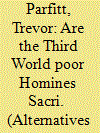

|
|
|
|
|
| Publication |
2009.
|
| Summary/Abstract |
This article examines how the concept of biopolitics is applied in development studies, focusing especially on Giorgio Agamben's account of biopolitics as intrinsic to the analysis of sovereignty and a state of exception. Agamben analyzes sovereignty as a biopolitical enterprise of disciplinary control in which sovereign power is able to enforce its role by the most draconian means while remaining nominally within the law. Agamben further claims that development is a biopolitical enterprise through which the Third World poor are reduced to a situation of bare life. The article interrogates this proposition, questioning how far biopolitics/development must necessarily be conceived as an exercise in oppression.
|
|
|
|
|
|
|
|
|
|
|
|
|
|
|
|
| 5 |
ID:
096555


|
|
|
| 6 |
ID:
160381
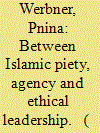

|
|
|
|
|
| Summary/Abstract |
In the face of the huge expansion in the number of women preachers throughout the Muslim world and beyond it, the paper proposes the need to theorise female ethical leadership – the subtle detour that Muslim women have been making to claim rights, including the right to leadership, within Islam, through their extraordinary acts of ascetic self-discipline (askesis). Building on Saba Mahmood’s Politics of Piety, the paper draws further on Foucault’s theory of the ethical subject, particularly in Volume III of The History of Sexuality, to demonstrate that it is women’s everyday asceticism coupled with their scholarly hermeneutical knowledge that is enabling these women to breach the citadel of male Islamic scholarship and leadership. In effect, they are foregoing certain personal freedoms in order to gain power and influence in religious spheres previously closed to them. In this their movement resembles feminist movements in Judaism and Christianity.
|
|
|
|
|
|
|
|
|
|
|
|
|
|
|
|
| 7 |
ID:
076865
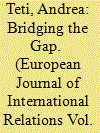

|
|
|
|
|
| Publication |
2007.
|
| Summary/Abstract |
Although International Relations and Middle East Studies share an interest in several aspects of Middle East politics, interdisciplinary research remains surprisingly scarce. This article asks why, despite repeated calls since the inception of these fields, this interdisciplinary gap has never been bridged. It supplements conventional approaches which emphasize a simple intellectual history, with elements of a political economy of the organization and production of knowledge, arguing that while intellectual convergence may be a necessary condition for interdisciplinarity, only a shift in epistemic grounds within which fields understand their scholarship can bring this about, and that this in turn requires a shift in the way knowledge is organized and produced. First, the article provides a genealogy of calls for interdisciplinary scholarship. Second, it locates interdisciplinary relations in the universalist organization of knowledge within which they emerged and which still (re)produce inter- and intra-disciplinary divides today. Finally, it considers the potential for Constructivism to provide an interdisciplinary bridge.
|
|
|
|
|
|
|
|
|
|
|
|
|
|
|
|
| 8 |
ID:
183715
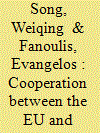

|
|
|
|
|
| Summary/Abstract |
The European Union's partnership with China has received significant academic attention. Experts have focused on both parties’ economic and political objectives and have made efforts to grasp the dynamics of the institutionalisation of EU-China cooperation. However, little has been said about how this collaboration affects the lives of citizens, especially in China. Adopting a Foucauldian epistemology, this article's key contention is that EU-China cooperation imposes a joint form of post-liberal governmental power on the Chinese population, which socially constructs empowered but not liberal political subjectivities for Chinese citizens. The article first reviews Foucault's approach to governmentality. It then explores Sino-EUropean collaboration after 2013, when the two partners established the ‘EU-China 2020 Strategic Agenda for Cooperation’. We illustrate how the institutionalisation of the partnership has been consistent with a governmentalised political rationality, and how policy implementation has allowed a post-liberal form of governmental power to flow from both EU and Chinese policymakers towards the Chinese population, triggering processes of political subjectivisation.
|
|
|
|
|
|
|
|
|
|
|
|
|
|
|
|
| 9 |
ID:
176025
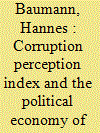

|
|
|
|
|
| Summary/Abstract |
The corruption perception index (CPI) compiled by Transparency International (TI) ranks countries by perceived levels of corruption. It is a reformist rather than a radical form of ‘statactivism’. First, I use Rose and Miller’s analytical framework to explain how corporate concerns come to dominate the CPI: How a neoliberal rationality is translated into a programme to govern corruption and then a technology – the CPI. A comprehensive survey of sources used to compile the CPI 2001–2016 shows that the vast majority were either produced for sale to corporate clients or were based on surveys of business elites. Second, I embed the index’s production into a wider political economy: TI workers are Gramscian intellectuals who put forward an interpretation of corruption that is non-threatening to corporate capital. This Gramscian framework holds wider relevance for analyses of the politics of global benchmarking.
|
|
|
|
|
|
|
|
|
|
|
|
|
|
|
|
| 10 |
ID:
159221
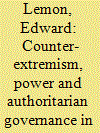

|
|
|
|
|
| Summary/Abstract |
Counter-extremism has become an important tool for the authoritarian government of Tajikistan to consolidate its position. In this article, we argue that counter-extremism is not purely about destructive acts, such as banning groups or arresting individuals: it is productive, too. Using a Foucauldian understanding of disciplinary power and biopower, we argue that counter-extremism in Tajikistan is an attempt to produce secular, docile citizen subjects who are resistant to extremist ideas. Using ethnography and discourse analysis, we focus on the way in which these practices are gendered, targeting the bodies of those deemed ‘dangerous’. Counter-extremism, we argue, is exercised not only by the state but also by citizens, who monitor themselves and others for signs of radicalization. Although some support state secularism, most merely accept it. A smaller group resist practices that target certain forms of religious belief and practice. We explore these everyday forms of resistance against disciplinary power and biopower.
|
|
|
|
|
|
|
|
|
|
|
|
|
|
|
|
| 11 |
ID:
187117
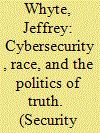

|
|
|
|
|
| Summary/Abstract |
This article explores the racial politics underwriting cybersecurity’s recent human turn toward the issues of online disinformation and ‘foreign influence’ in US politics. Through a case study of the Black Lives Matter (BLM) movement, this article’s first half considers how contemporary cybersecurity has produced ‘racial division’ as an object of security by framing the BLM movement as a geopolitical vulnerability open to foreign manipulation through social media. In its emphasis on the political protest as a site of insecurity, I argue that contemporary cybersecurity has widened its traditional spatiality ‘beyond the computer’. In the article’s second half, I argue that the racialization of cybersecurity has underwritten a politics of truth ultimately concerned less with parsing true from false, and more with defining the boundaries of secure political knowledge and communication. I argue that contemporary cybersecurity has produced an idealized subject for whom an obligation to possess contingent forms of knowledge becomes a condition of secure political subjectivity. I conclude with a critique of contemporary cybersecurity’s tendency to portray dissident political movements like BLM as ignorant or disinformed.
|
|
|
|
|
|
|
|
|
|
|
|
|
|
|
|
| 12 |
ID:
128527
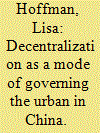

|
|
|
|
|
| Publication |
2013.
|
| Summary/Abstract |
This paper considers what a Foucauldian-informed analysis of decentralization and urban transformation offers to current debates. It analyzes decentralization as a new regime of governing, in contrast to many studies that treat it as a policy process, objective or outcome aimed at alleviating some problem of centralized authority. Rather than understanding decentralization as less state governance, this paper asks how practices such as local autonomy are in fact technologies of governing the urban. Decentralization is analyzed then not simply as an absence of some central state power, either in the political or fiscal realm, but rather, as new mechanisms of governing the urban, which are linked with the regulation and constitution of subjects. The paper focuses on an aspect of decentralization that typically is under-examined: the decentralization of welfare provisioning in urban China. Under high socialism of the Maoist era, social services for urban residents were distributed by the state, through the work unit (danwei) as part of the planned economy. In recent years, however, major reforms have been put into place to diversify the ways in which social services are delivered, under a general rubric of decentralizing the distribution away from the state. Based on anthropological research in Dalian, a major port city in northeast China, this paper examines a new social practice and subject form that has emerged with new ways of caring for those in need in the city: volunteerism. By focusing on this resulting social form, the paper argues that we may better understand how decentralization is not a singular process with multiple outcomes, but rather, a complex assemblage of elements that includes technical questions about how to govern as well as normative practices of subject formation. An analytical disaggregation of these elements also allows us to avoid the assumption that decentralization necessarily contains certain characteristics, or that it will lead to particular kinds of political and social forms.
|
|
|
|
|
|
|
|
|
|
|
|
|
|
|
|
| 13 |
ID:
133827
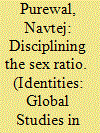

|
|
|
|
|
| Publication |
2014.
|
| Summary/Abstract |
The 'girl child' has attracted a considerable amount of attention in India as an object of policy addressing gender discrimination. This article examines the field of campaigns seeking to address female foeticide and positions the public discourse on the 'girl child' and sex selective abortion in India within a broad cultural backdrop of son preference. The article argues that anti-female foeticide campaigns exist within a disciplinary domain of female foeticide which both generates a discourse of saving the 'girl child' and also shows attempts to utilise both incentives and punitive measures in carving out a female foeticide carceral space.
|
|
|
|
|
|
|
|
|
|
|
|
|
|
|
|
| 14 |
ID:
124778
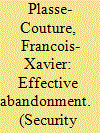

|
|
|
|
|
| Publication |
2013.
|
| Summary/Abstract |
Towards the end of 2012, a group of Israeli settlers and right-wing activists attacked an Israel Defense Forces (IDF) base on the West Bank. IDF soldiers and members of the Israeli Knesset had provided information to the attackers, who adopted a 'bring it on' tone that commentators described as echoing 'civil war'. As the occupation blurs the categories of inside/outside, what we are witnessing is a challenge to the traditional distinction between politics and war. Accordingly, we are moved to think in terms of the distribution and variable intensities of violence, rather than to accept simple debates about either the absence or presence of war or the monopoly of violence. This article seeks to examine the evolving relationship between the state and society in the wake of the so-called Arab Spring through an investigation of the relationship between neoliberalism and sovereign violence. It argues that 'price tag' actions perpetrated in the Occupied Territories and Israel are the effect of a neoliberal organization of power characterized by a form of governing by non-intervention, where the abandonment of certain parts of society produces the desired containment of elements considered undesirable to the body politic. This article challenges Weber's theory of state sovereignty as the monopoly of legitimate state violence, arguing instead that state apparatuses may in fact 'outsource' violence. We can understand this shift in the mode of operation of sovereignty by theorizing 'society' as the effect of warlike relations whereby particular tactics and strategies are employed as a way of organizing and policing forms of life necessary for the continuation of a particular body politic.
|
|
|
|
|
|
|
|
|
|
|
|
|
|
|
|
| 15 |
ID:
078891
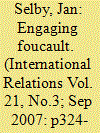

|
|
|
|
|
| Publication |
2007.
|
| Summary/Abstract |
This article provides a critical survey of the appropriation of the work of Michel Foucault within poststructuralist IR. Foucault has thus far been employed within poststructuralist IR in three ways: to support deconstructions of realist international theory; to analyse modern discourses and practices of international politics; and to develop novel accounts of the contemporary global liberal order. I argue that the first and the third of these usages are especially problematic. Utilised for the critique of realism, Foucault's main emphases have consistently been overlooked or misrepresented. By contrast, when `scaled up' to inform analyses of world order, Foucault's work has ended up supporting essentially liberal accounts of international politics. There are, I argue, clear limits to the use of Foucault in theorising international and world politics, and given this I conclude that if Foucault is to be used more effectively within IR, his work needs to be situated within a framework - I suggest a Marxist one - which is cognisant both of the structural dimensions of power, and of the specificity and irreducibility of the international
|
|
|
|
|
|
|
|
|
|
|
|
|
|
|
|
| 16 |
ID:
110777
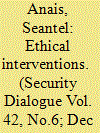

|
|
|
|
|
| Publication |
2011.
|
| Summary/Abstract |
This article employs some of the theoretical and methodological tools devised by Michel Foucault to explore the political rationale suggested by the proliferation and use of a class of weapons collectively referred to as 'non-lethal'. The invention and continued use of non-lethal weapons has been treated in existing literature as an ethical crisis. This article connects the emergence of non-lethal weaponry to the mobilization of a sense of ethical crisis concerning the humane treatment of civilians and combatants in conflicts in the United States and beyond. Policies related to non-lethal weaponry, along with the practices that they engender, are also explored in relation to the notion of 'partial citizenship'. Offering a contribution to the genealogy of non-lethal weapons, this article traces their involvement in the policing by US military agents of a variety of sites, actors, and contexts outside of the theater of war.
|
|
|
|
|
|
|
|
|
|
|
|
|
|
|
|
| 17 |
ID:
080304
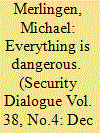

|
|
|
|
|
| Publication |
2007.
|
| Summary/Abstract |
The article builds on the existing critique of `Normative Power Europe' (NPE), extending it in previously unexplored directions by drawing on the work of Michel Foucault. The author conceptualizes and empirically demonstrates the hidden face of European Union (EU) norm diffusion. The EU promotes human agency abroad through the promotion of fundamental civil, political and economic rights. This is the celebrated face of European foreign policy. Its other face - ignored by students of NPE (proponents and critics alike) - is that the EU's self-styled mission for humanity inscribes the very agency of those it seeks to empower in relations characterized by epistemic violence, the technologization of politics and administrative arbitrariness. The author delimits a conceptual space for investigating the two faces of NPE, making the case for a micropolitical analysis of EU norm diffusion. In two empirical snapshots, the article brings into focus the deep ambiguity of the EU's post-sovereign normative power.
|
|
|
|
|
|
|
|
|
|
|
|
|
|
|
|
| 18 |
ID:
157596


|
|
|
|
|
| Summary/Abstract |
Queer International Relations’ momentum in the past four years has made it inconceivable for disciplinary IR to make it ‘appear as if there is no Queer International Theory’. The ‘queer turn’ has given rise to vibrant research programmes across IR subfields. Queer research is not only not a frivolous distraction from the ‘hard’ issues of IR, but queer analytics crack open for investigation fundamental dimensions of international politics that have hitherto been missed, misunderstood or trivialised by mainstream and critical approaches to IR. As queer research is making significant inroads into IR theorising, a fault line has emerged in IR scholarship on sexuality and queerness. Reflecting the tensions between Lesbian, Gay, Bisexual and Transgender (LGBT) Studies and Queer Theory in the academy more broadly, the IR literature on (homo)sexuality largely coalesces into two distinct approaches: LGBT and Queer approaches. The article will lay out the basic tenets of Queer Theory and discuss how it diverges from LGBT Studies. The article then turns to the books under review and focuses on the ways in which they take up the most prominent issue in contemporary debates in Queer Theory: the increasing inclusion of LGBT people into international human rights regimes and liberal states and markets. The article finishes with a brief reflection on citation practices, queer methodologies and the ethics of queer research.
|
|
|
|
|
|
|
|
|
|
|
|
|
|
|
|
| 19 |
ID:
174896
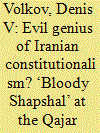

|
|
|
|
|
| Summary/Abstract |
Late Imperial Russia’s multifaceted presence in Persia retains many fascinating life-stories of its actors, who often exerted crucial influence on the course of the history of Russian-Iranian relations of the time. Drawing on international scholarship about the Russian-Iranian relationships at the turn of the twentieth century, but mostly on documents from Russian and Georgian archives and the diaries of his contemporaries as well as his own private notes, this article examines the activities of Seraia Shapshal (1873–1961), focusing on his embeddedness both in the Qajar court and in Late Imperial Russia’s policy towards Iran during the period 1900 to 1908. The paper for the first time in Iranian studies sheds light in sufficient detail upon how Shapshal found himself in Persia and what enabled him to reach the highest levels of power at the Qajar court. In so doing, it also identifies his leading role in the June 1908 anti-constitution coup.
|
|
|
|
|
|
|
|
|
|
|
|
|
|
|
|
| 20 |
ID:
182653
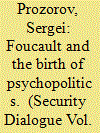

|
|
|
|
|
| Summary/Abstract |
The article contributes to the genealogy of current tendencies in crisis governance by reconstructing Michel Foucault’s analysis of the application of the notion of crisis in 19th-century psychiatry. This analysis complements and corrects Reinhart Koselleck’s history that viewed crisis as originally a medical, judicial or theological concept that was transferred to the political domain in the 18th century. In contrast, Foucault highlights how the psychiatric application of the concept of crisis was itself political, conditioned by the disciplinary power of the psychiatrist. Unlike the ancient medical concept of crisis that emphasized the doctor’s judgement in observing the event of truth in the course of the disease, psychiatric crisis is explicitly forced by the doctor in order to elicit the desired symptoms in the patient and convert their power of disciplinary confinement into medical diagnosis. The article argues that this notion of crisis resonates with the tendencies observed in contemporary crisis governance in Western societies. While these tendencies are often addressed in terms of ‘psychopolitics’ that presumably succeeds Foucault’s ‘biopolitics’, we suggest that Foucault’s own work on psychiatric power offers a valuable genealogical perspective on the contemporary governance of crises.
|
|
|
|
|
|
|
|
|
|
|
|
|
|
|
|
|
|
|
|
|